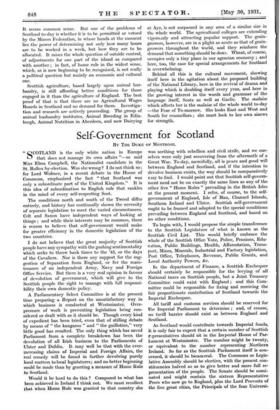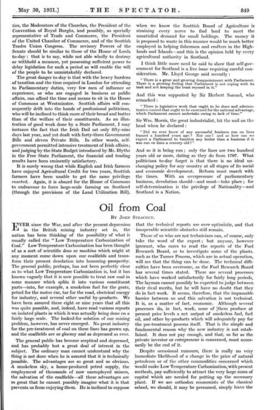Self-Government for Scotland
BY Tim DUKE
OF MONTROSE.
" SCOTLAND is the only white nation in Europe 1.0 that does not manage its own affairs "—so said Miss Elma Campbell, the Nationalist candidate in the St. Rollox by-election. Was she wrong ? I do not think so ; for Lord Wollner, in a recent debate in the House of Commons, emphasized the fact " that Scotland was only a subordinate part of the United Kingdom." It is this idea of subordination to English rule that rankles in the mind of every self-respecting Scot.
The conditions north and south of the Tweed differ entirely, and history has continually shown the necessity of separate legislation to meet the varied circumstances. Celt and Saxon have independent ways of looking at things ; and while their interests may be common, there is reason to believe that self-government would make for greater efficiency in the domestic legislation of the two countries.
I do not believe that the great majority of Scottish people have any sympathy with the gushing sentimentality which seeks to throw back times to the '45, or the days of the Cavaliers. Nor is there any support for the sug- gestion of Separation from England, or for the main- tenance of an independent Army, Navy and Foreign Office Service. But there is a very real opinion in favour of devolution of government, which will give to the Scottish people the right to manage with full responsi- bility their own domestic policy.
A Parliamentary Select Committee is at the present time preparing a Report on the unsatisfactory way in which business is conducted at Westminster. Over- pressure of work is preventing legislation being con- sidered or dealt with as it should be. Though every kind of expedient has been tried, even that of stifling debate by means of " the kangaroo " and " the guillotine," very little good has resulted. The only thing which has saved Parliament from a complete breakdown has been the devolution of all Irish business to the Parliaments of Ulster and Dublin. It may well be that with the ever- increasing claims of Imperial and Foreign Affairs, the real remedy will be found in further devolving purely local matters to local legislatures ; and no better beginning could be made than by granting a measure of Home Rule to Scotland.
Would it be hard to do this ? Compared to what has been achieved in Ireland I think not. We must recollect that when Home Rule was granted to that country she was seething with rebellion and civil strife, and we our- selves were only just recovering from the aftermath of a Great War. To-day, mercifully, all is peace and good will between England and Scotland, and if the intention to devolve business exists, the way should be comparatively easy to find. I would point out that Scottish self-govern- ment need not be on exactly the same lines as any of the other five " Home Rules " prevailing in the British Isles at the present moment. I refer, of course, to the self- government of England, Isle of Man, Channel Islands, Southern Ireland and Ulster. Scottish self-government ought to be framed and adapted to the special conditions prevailing between England and Scotland, and based on no other conditions.
To begin with, I would propose the simple transference to the Scottish Legislature of what is known as the Scottish Civil List. This would briefly embrace the whole of the Scottish Office Vote, Police, Pensions, Edu- cation, Public Buildings, Health, Afforestation, Trans- port, Mines, Minerals, Industrial and Factory _legislation, Post Office, Telephones, Revenue, Public Grants, and Local Authority Powers, &c.
In the department of Ymance, a Scottish Exchequer should certainly be responsible for the levying of all National taxes on Scottish people, but a Joint Treasury Committee could exist with England ; and this Com- mittee could be responsible for fixing and receiving the fair proportionate contribution of Scotland towards the Imperial Exchequer.
All tariff and customs services should be reserved for the Imperial Parliament to determine ; and, of course, no tariff barrier should exist as between England and Scotland.
As Scotland would contribute towards Imperial funds, it is only fair to expect that a certain number of Scottish r2presentatives should sit in the Imperial House of Par- liament at Westminster. The number might be twenty, or equivalent - to the number representing Northern Ireland. So far as the Scottish Parliament itself is con- cerned, it should be bicameral. The Commons or Legis- lative Assembly should be elective, with the present con- stituencies halved so as to give better and more full re- presentation of the people. The Senate should be nomi- nated and might contain the sixteen Representative Peers who now go to England, plus the Lord Provosts of the five great cities, the Principals of the four Universi- ties, the Moderators of the Churches, the President of the Convention of Royal Burghs; and possibly, as specially representative of Trade and Commerce, the President of the United Chamber of -Commerce, and of the Scottish Trades Union Congress. The revisory Powers of the . Senate should be similar to those of the House of Lords • to-day : that is to say, while not able wholly to destroy or withhold a measure, yet possessing sufficient power to delay legislation for such a period as will enable the will of the people :to be unmistakably declared.
The great danger to-day is that with the heavy burdens . of taxation and the time required in London for attending to Parliamentary duties, very" few men of influence or experience, or who are engaged in business or public . affairs, can afford the time and means to sit in the House of Commons at Westminster. Scottish affairs will con- sequently drift into the hands of professional politicians, who will be inclined to think more of their bread and butter than of the welfare of their constituents. As an illus- tration of good work done by a State Parliament, I may instance the fact that the Irish Dail sat only fifty-nine . days last year, and yet dealt with forty-three Government Bills and eleven Private Bills. In other words, self- government permitted intensive treatment of Irish affairs; and judging by the State Budget introduced by Mr. Blythe in the Free State Parliament, the financial and trading results have been eminently satisfactory.
It is surely wrong that while English and Irish farmers have enjoyed Agricultural Credit for two years, Scottish farmers have been unable to get the same privilege enacted. Again, it is absurd for the House of Commons to - endeavour to force large-scale farming on Scotland (through the provisions of the Land Utilization Bill), when we know the Scottish Board of Agriculture is straining every nerve to find land to meet the unsatisfied demand for small holdings. The money it is proposed to waste in this manner would be much better employed in helping fishermen and crofters in the High- lands and Islands—and this is the opinion held by every agricultural authority in Scotland.
I think little more need be said to show that self-gov- ernment for Scotland is a live issue requiring careful con- sideration. Mr. Lloyd George said recently : " There is a great and growing disappointment with Parliament. There iii a growing feeling that Parliament is not coping with its task and not keeping the trust reposed in it."
And this was supported by Sir Herbert Samuel, who remarked : " There is legislative work that ought to be done and adminis• trative control that ought to be exercised for the national advantage, which Parliament cannot undertake owing to lack of -time."
Sir Wm. Morris, the great industrialist, hit the nail on the head when he declared : " Did we ever know of any successful business run on lines framed a hundred years ago 7 Not one and so how can we expect a Parliament to function any better than a business if it was run on lines a century old !"
And so it is being run ; only the lines are two hundred years old or more, dating as they do from 1707. What politicians to-day forget is that there is no ideal
un-
changing policy for any country at all stages of its social and economic development. Reform must march with the times. With an overpressure of parliamentary business, devolution should—and must—take place ; for self-determination is the privilege of Nationality—and Scotland is a Nation.







































 Previous page
Previous page